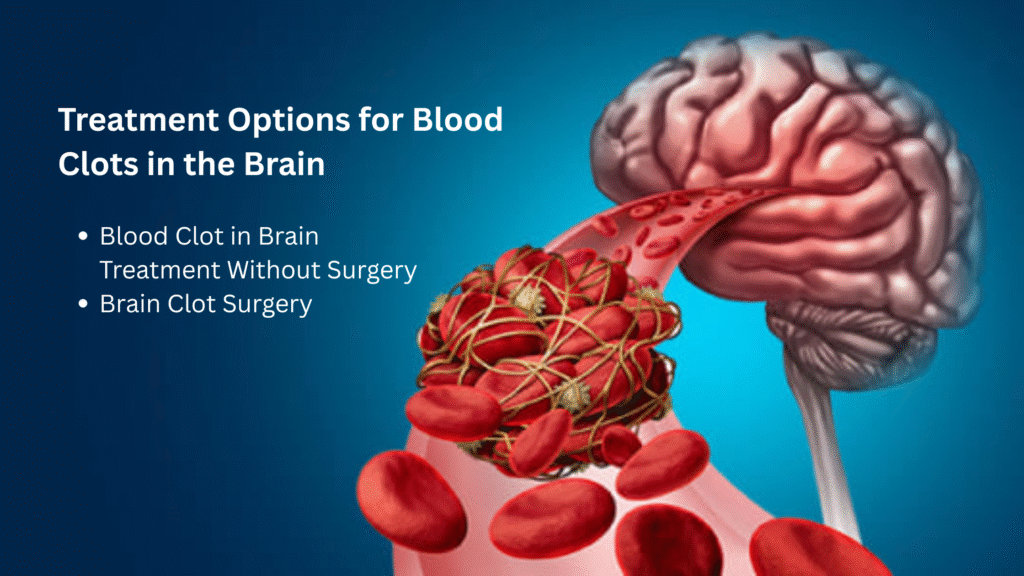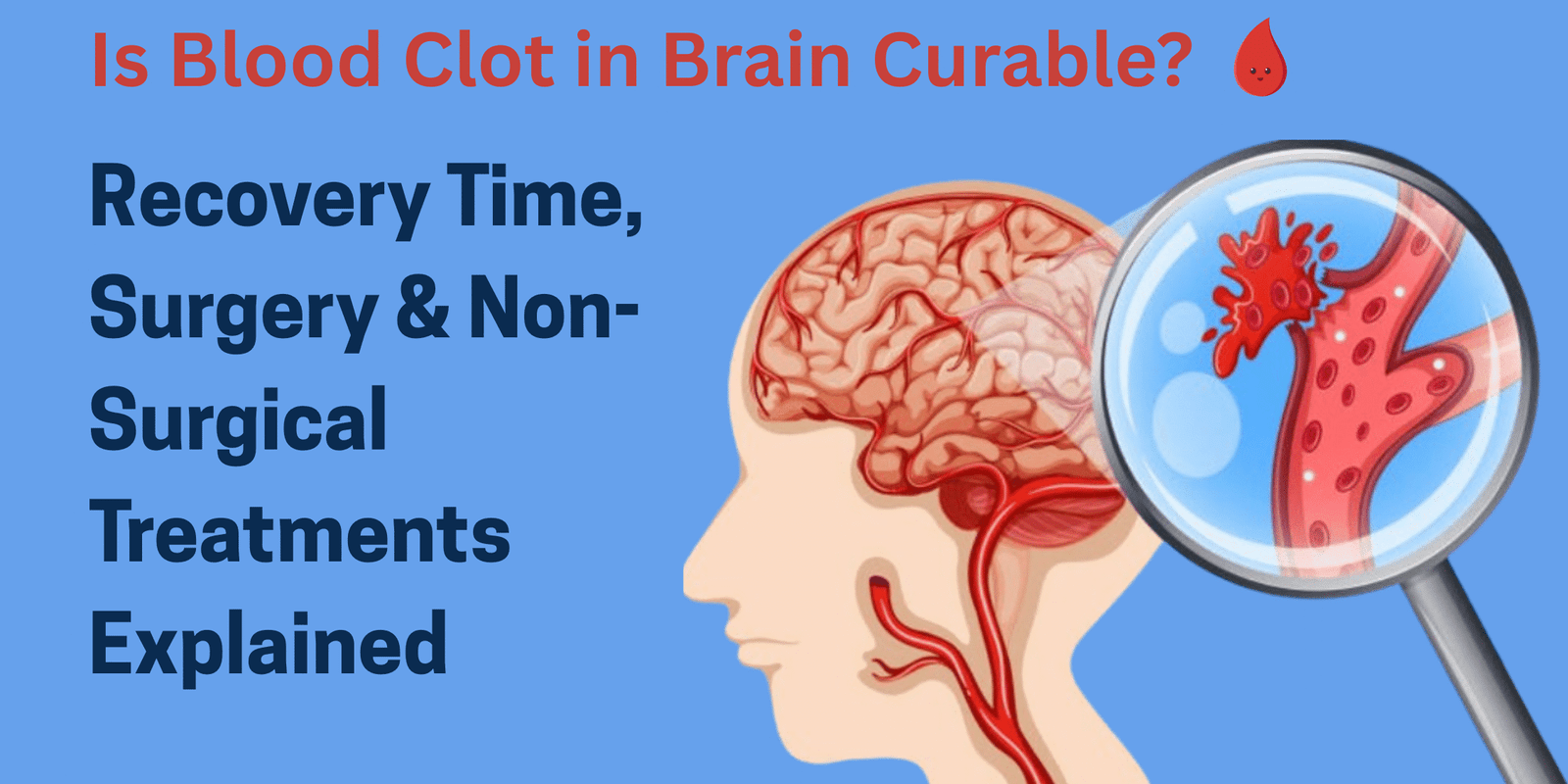A brain clot forms due to blockages in the blood vessels to the brain, reducing the flow of oxygen. In the absence of oxygen, brain cells begin to perish, leading to stroke, paralysis, or death if undiagnosed.
The World Health Organization (WHO) states that annually, 15 million people worldwide suffer a stroke. These statistics emphasize the need for awareness about blood clot in brain treatment and its timely management.
You can actually treat or manage a brain clot most of the time with early diagnosis.
Key Takeaways
- Early diagnosis and intervention are critical for full recovery.
- Surgical and medical treatment will depend on the size and severity of the clot.
- The role of healthy living is to support recovery and prevent relapse.
- Rehabilitation therapies can support the recovery of function in the brain and body.
- Emergency care can save lives and improve outcomes.
What Causes Blood Clots in the Brain?
A blood clot may develop as a result of several conditions, which include:
- High blood pressure
- Diabetes
- Smoking
- Head injury or trauma
- Heart disease
- Atrial fibrillation (a type of irregular heartbeat)
- Genetic clotting disorders
Even being dehydrated or being immobile for a long period of time can increase your risk. Knowing some of the causes will help you understand how to prevent blood clots in the brain effectively.
Symptoms You Should Never Ignore
A blood clot in the brain frequently presents stroke symptoms. Signs include:
- Sudden weakness or paralysis on one side of the body
- Headaches that are severe and have no cause
- Confused or slurred speech
- Double vision or blurred vision
- Dizziness or a loss of balance
- Fainting or having seizure activity
If you see these symptoms, immediate emergency room assistance needs to be initiated. Early diagnosis will preserve brain function and potentially save a life.
Is Blood Clot in Brain Curable?
“Is a blood clot in the brain curable?” is a common question. Indeed, blood clots in the brain can be treated. However, a successful outcome will depend on both a diagnosis and that treatment is initiated quickly.
Detecting a blood clot on time makes it feasible to dissolve or remove the clot before serious damage. According to the imaging study and the size of the clot, the doctor may suggest medication, or a blood clot in the brain treatment without surgery, or the need for brain clot surgery.
Treatment Options for Blood Clots in the Brain
Let’s explore how modern medicine manages this serious condition.

1. Blood Clot in Brain Treatment Without Surgery
Not all patients require surgery. In many circumstances, blood clots can be dissolved using medications such as:
- Thrombolytics (clot busters): These medications dissolve the clot quickly if given within hours of a brain stroke.
- Anticoagulants (blood thinners): They continue to help prevent new clots from forming and prevent clots from getting larger.
- Antiplatelet medications: Help decrease the stickiness of platelets to allow blood to flow smoothly.
These blood clot in the brain treatment options are most effective if received quickly, usually within 3 to 4.5 hours after symptoms appear.
If you are curious about “how can blood clot in brain be dissolved?” Some small clots can sometimes dissolve on their own, through healthy lifestyle habits and the body’s enzymes, but still under medical supervision.
2. Brain Clot Surgery
After the failure of medications or when the clot is massive, brain clot surgery is required. In such situations, various surgical techniques are employed by the top neurosurgeon in Hyderabad and other specialists:
| Type of Surgery | Purpose | Procedure |
| Craniotomy | Removes large clots or repairs damaged vessels | The skull section is temporarily opened to access the clot |
| Endovascular Thrombectomy | Removes clot using a catheter | A thin tube is guided through the blood vessels to pull out the clot |
| Decompressive Surgery | Reduces brain pressure | Part of the skull is removed temporarily to allow swelling to subside |
Surgery is highly effective in preventing further strokes and restoring brain function.
How to Cure Blood Clot in Brain Naturally
If the situation is mild, the doctor may discuss nonsurgical options for how to remove blood clot in the brain without surgery, which often include medical therapy and supportive care. The patient could consider:
- Keeping healthy blood pressure and blood sugar
- Taking anticoagulation medications on a regular basis
- Eating a diet rich in fruits, omega-3s, and antioxidants
- Engaging in moderate levels of exercise to promote circulation
- Refraining from smoking and drinking alcohol
- Hydrating themselves with adequate fluids
Making these lifestyle changes will help you avoid blood clots in the brain and improve the pace of healing.
Recovery and Rehabilitation
The blood clot in brain recovery time depends on the following:
- The severity of the clot and its size
- The area of the brain affected
- Your age and general health
- The speed of your medical response
The brain clot recovery time can be anywhere from weeks to months. Rehabilitation might include:
- Physiotherapy: To regain movement after paralysis
- Speech therapy: To regain speech and improve memory
- Occupational therapy: To return to their activities of daily living
With time and skilled medical care, many people are able to resume their everyday lives after suffering a stroke or a clot.
Prevention: How to Avoid Blood Clots in the Brain
How to avoid blood clots in the brain is a common question. It is always easier to prevent something than to treat it. You may be able to reduce your risk of bleeding by:
- Clearly managing blood pressure, cholesterol levels, and diabetes
- Staying fit and not sitting for long periods
- Maintaining a healthy weight
- Avoiding cigarettes and too much alcohol
- Eating “brain food” like nuts, leafy greens, and fish
Also, be aware that which of the following helps in clotting of blood – Vitamin K. While this vitamin is necessary to help you heal your wounds, if there is too much, Vitamin K can stop or interfere with blood thinners. Always follow your doctor’s instructions.
Consult the Experts Now for a Healthy Life!
While a blood clot in the brain may sound scary, recovery is possible with an accurate diagnosis, modern treatment, and rehabilitation. If treated quickly, it is possible to avoid long-term complications, such as paralysis and memory loss. Surgical or non-surgical medications aim to restore blood flow and protect brain functions.
In the moment of a brain stroke-like incident, it is imperative to act quickly; every minute counts. Seeking the advice of an experienced neurosurgeon, such as Dr. Raveesh Sunkara, can provide professional treatment and guidance to help patients regain control of their lives.
FAQs
Can blood clots in the brain be treated effectively?
Yes, with early diagnosis and appropriate treatment, most people with either show more than a good recovery.
What is the recovery period for an initial clot in the brain?
The patient’s recovery period varies from weeks to months, depending on the clot size, location, and health of the patient.
How do you treat a clot in the brain without surgery?
Doctors prescribe blood-thinning or clot-dissolving medications and treat them medically under close supervision.
Can I have permanent paralysis from a clot in the brain?
Possibly, if treated fast, a patient can suffer paralysis; however, with rehabilitation, a patient can regain partial or complete motion.
How do you prevent clots in the brain naturally?
Maintain a healthy activity level, if applicable, a healthy blood pressure and sugar levels, not smoking, and a heart-healthy diet.







